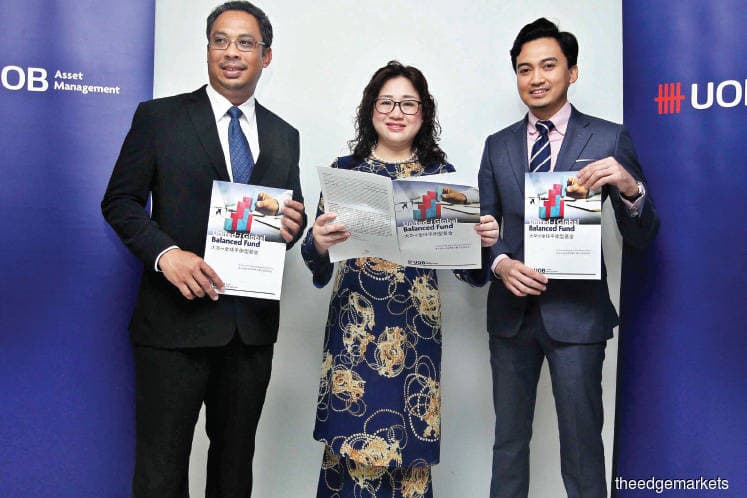
This article first appeared in The Edge Financial Daily on March 14, 2019
KUALA LUMPUR: The local equity market is presently in a period of consolidation which is expected to continue at least until the end of the second quarter (2Q), according to UOB Asset Management (M) Bhd.
The FBM KLCI’s valuation is not “extremely cheap” at about 15 to 16 times, which is its historical mean, said chief executive officer Lim Suet Ling.
“The valuation for the index is fair given with all the noises in the background. So, more clarity is needed before we move out from the consolidation phase,” Lim said at a media briefing following the launch of the firm’s first syariah-compliant global balanced fund, United-i Global Balanced Fund (U-iGBF), here yesterday.
She expects the index, which closed seven points higher to 1,678.24 points yesterday, to stay between 1,650 and 1,750 points this year.
“The longer the index is in consolidation phase, the better it is,” she remarked, as this would allow the KLCI to pick up when earnings improve, and the economy is steadier.
For 2019, Lim expects to see 3% to 7% corporate earnings growth, as corporates are generally conserving cash and not planning to expand.
Coupled with external headwinds in the form of the Sino-US trade dispute and Brexit, other risks include the coming Asian elections — Indonesia and Taiwan, among others — and slower China growth, as well as car tariffs, Lim observed.
Internally, Malaysia is also still in a transition phase.
“The new government has came in almost a year, and they are cleaning up our fiscal position,” she said, adding the move to renegotiate better prices for mega infrastructure projects is good for the local economy over the medium term.
She said the equity market remains the most attractive asset class, with consumer, automotive, and manufacturing having a little bit of the upper hand over other sectors at present.
The fund is neutral on banks as they are a proxy to the economy, and slightly underweight on construction — pending greater clarity on job contracts — property, and plantations.
While Lim is confident there would not be a global recession this year, she does not rule out the possibility of it occurring in the later part of 2020, given that the world has seen the longest expansion in terms of global economic growth.
Citing one of the many indicators for a recession — the inverse 10 to two-year treasury yield curve — she said a sustainable inverse yield would historically indicate a possible recession. But, as the yield curve has yet to enter the negative territory, she is not expecting a global recession any time soon.
Nonetheless, if it does enter the negative territory, she said the inverse yield curve has historically led a recession by 18 months.
In terms of the ringgit, chief investment officer of UOB Islamic Asset Management Sdn Bhd Muhammad Zulfadzlie Zulkifli observed that it is also in a consolidation phase as the country had scrapped the goods and services tax and is relying on oil revenue. As such, he believes the ringgit will trade sideways until the internal and external uncertainties are resolved.
At the time of writing, the local unit had weakened 0.13% to 4.0890 against the greenback.
At the launch of the U-iGBF, UOB Islamic Asset Management chief executive director Suhazi Reza Selamat said the fund seeks to help Malaysian investors achieve a stable income with lower volatility by investing in a diversified global portfolio of syariah-compliant asset classes.
He said the U-iGBF applies syariah filters to selected syariah-compliant global equities and sukuk to generate income and capital appreciation, adding that the fund is suitable for investors with a moderate risk appetite and a medium to long-term investment horizon.
Moreover, the fund aims to reduce investment volatility by screening companies that are overleveraged or have unproductive cash piles.
“This ensures that only companies with low debt ratios and strong fundamentals are included for selection, providing investors with potentially lower investment risk and competitive returns,” he said.